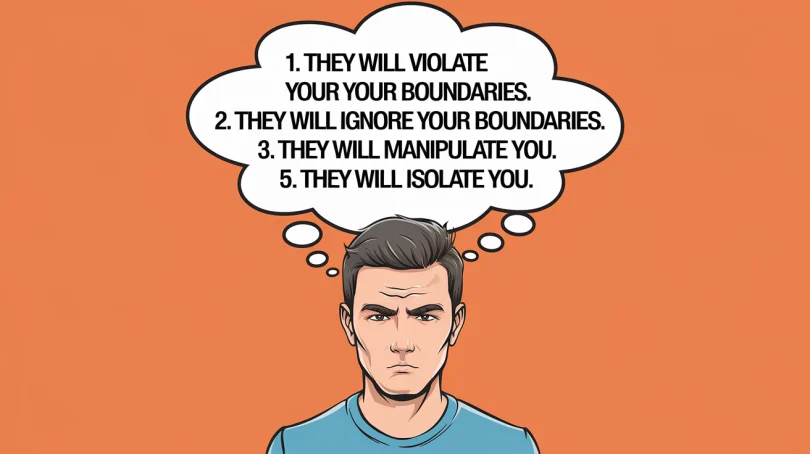There is nothing that threatens a toxic person more than your boundaries. If you had boundaries, they wouldn’t have control or dominance over you and that’s the goal of every narcissistic or toxic person. They want you to feel powerless. Having boundaries means understanding your worth and value; having limits means knowing how you deserve to be treated. It means you respect yourself enough to stand up for what is right and say, “I will not tolerate certain things in my relationships.” This is a narcissist’s nightmare.
Let’s get into the five ways a narcissist will undermine or weaponize your boundaries. When it happens, you won’t be surprised and have a plan.
1. They Will Play the Victim
Of course, they will. The kryptonite of every narcissist is accountability. When was the last time you heard them take responsibility, apologize, or care about the impact their words or actions had on you? If the answer is “never,” that sounds about right. They are quick to point out your flaws, but if you ever bring up theirs, you will be punished. When you set a boundary around your time or express your limits, they’ll likely guilt-trip you, convincing you that you’re being cruel or hurting them. They’ll say things like, “I thought we were a team,” making it sound like your boundary is damaging your bond together. In reality, they aren’t interested in connection they’re only interested in control. Your freedom to say “no” or set limits means they lose that control, so they’ll plant the seed in your mind that your autonomy is harming them or endangering the relationship. But don’t fall for it.
For instance, if you say, “I’m not comfortable doing that or going there,” a toxic person might respond, “I thought you loved me.” Since you likely want this person to feel loved and valued, you might abandon your boundaries just to make them happy. But remember: you don’t have to abandon yourself to make the right person happy. The right person wants to know your limits; they want you to feel safe and won’t pressure you into something you don’t want to do. That’s not love that’s abuse.
2. They Will Gaslight You
They might initially listen to your boundary and say nothing, which you interpret as understanding. But when they overstep or ignore that same boundary, they will gaslight you, insisting, “That’s not what you said.” It will be a pointless argument because they’re not going to take any accountability. According to them, you either didn’t communicate it well enough, or they simply forgot. It’s never their fault. This is why, around a toxic person, you feel like you need to be a lawyer, covering every single detail, lest they find a loophole. And as you over-communicate, they’ll call you “crazy” and shame you for being paranoid and distrustful.
If you bring up past incidents that justify why you need to over-communicate, they’ll twist it, confidently framing you as the “crazy” one. Narcissists speak in absolutes: “You never trust me,” “You always start a fight,” “You never care about my feelings.” If you listen carefully, they’re telling you their playbook: they don’t trust you, they’re always starting fights, and they don’t care about your feelings. By blaming you first, they position themselves as the victim.
3. They’ll Accuse You of Controlling Them
If you set any boundaries, they’ll accuse you of trying to control them. They’ll say, “You never cared about me,” or, “No one else would put up with your controlling behavior like I have.” Here, they’re baiting you into a fight. Remember, if the narcissist can provoke a fight, it means they still have control over you. They thrive on this control because nobody fights for something they don’t value. Engaging in arguments with them only reinforces their sense of power.
Related Topics:
10 Must Know Signs You’re Dealing With Narcissistic Abuse
10 Reasons Why Toxic People Want to Destroy Super Empaths
8 Hoovering Tactics Of A Narcissist
12 Psychological Tricks To Read Anyone INSTANTLY(
7 Lies About Narcissism We Like to Tell Ourselves.
Instead of punishing a narcissist through fighting, consider responding with indifference. The moment they realize that you no longer take the bait of their accusations, lies, or threats they feel worthless and panic. You’ll never hear them say, “Why do you feel this boundary is necessary?” because they have no interest in understanding your inner world. Boundaries aren’t about controlling anyone; they’re about protecting yourself. A healthy boundary isn’t about forcing someone else to do something; it’s about how you will respond to X, Y, or Z. There’s a big difference.
4. They Will Mock and Dismiss Your Boundaries
To make you look like the bad guy, they need to spin your boundaries as selfish or uncaring. They’ll mock, dismiss, and invalidate any boundary they disagree with, using phrases like, “You’re so sensitive,” “You’re making a big deal out of nothing,” or, “Why are you ruining a good day?” The hardest part is that we often believe them. We don’t want to be seen as controlling or negative, and we care deeply about this person.
When someone we care about tells us we’re the problem, we often believe them, especially if we have a history of being labeled as “the problem.” We may have a history of working hard to earn love, tolerating mistreatment, and feeling grateful just for the smallest bit of respect or love. We’ve tolerated the bare minimum for so long that it’s become what we’re used to. But remember, you are lovable, valuable, and worthy of kindness and respect. You deserve someone who values you, listens to you, and consistently cares about your heart.
5. They Will Punish You for Setting Boundaries
The most common reaction of a toxic person to your boundaries is to punish you. They might yell at you, belittle you, give you the silent treatment, isolate you from others, lie about you, or make your life miserable in any way they can. They’ll even create random “boundaries” of their own as retaliation, turning your request for respect into a power struggle.
Setting boundaries with a narcissist is challenging because they view any attempt to establish limits as an invitation for a power play. You end up apologizing or backtracking just to keep the peace. But here’s the problem: when we abandon ourselves, we never experience real peace. A narcissistic person will keep pushing you until you break because it’s never about peace for them it’s about power.
A narcissist won’t respect your boundaries, and that’s the harsh truth. They don’t value your needs or desires; they don’t respect your limits. So, what’s the next step? You can’t force them to respect your boundaries, and attempting to do so will only exhaust you. The reality is, that you can’t have a fulfilling relationship with someone who disregards your feelings, needs, or boundaries. So, you must ask yourself: how much access to yourself does this person deserve?
This realization often leads people to leave toxic relationships, even if it’s a family member or spouse. It’s painful but necessary to choose between staying and suffering or distancing yourself and grieving the loss. Remember, staying in a toxic relationship is like trying to save a drowning person who’s pulling you under. To survive, sometimes you have to let go not out of abandonment, but out of a need to protect yourself.
Toxic people may have had a difficult past, and we can feel empathy for them. But empathy doesn’t require us to tolerate abuse. You deserve respect, kindness, and consideration in all your relationships. Remember, setting boundaries is a form of self-care, and it is an essential step toward protecting yourself from further harm.







Leave a Comment